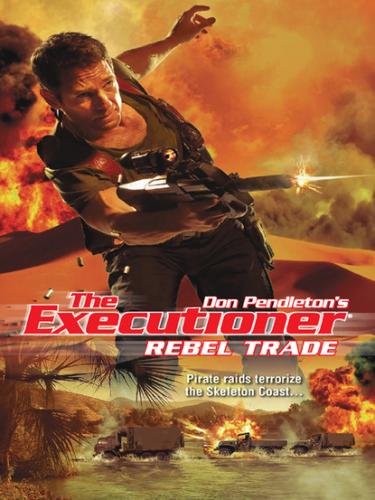Deadly Plunder
A red flag goes up in Washington after pirates murder the innocent crew of a U.S. merchant vessel off the coast of Namibia. Backed by certain authorities and protected from the law, the African rebel group behind the attack believes they are untouchable...but Mack Bolan is about to change that.
Sent in to restore balance, Bolan is on a seek-and-destroy mission—eliminate the key players one at a time and burn the organization to the ground. But victory will be no easy feat, as the rebel leader, with no intention of surrendering, quickly calls in reinforcements. Yet the group makes one fatal error—not seeing the Executioner coming.
It was a gamble, but Bolan made his decision
He moved out, scuttling through the darkness where he knew a deadly snake or scorpion might strike at any second. But venom was way down the list of Bolan’s concerns at the moment.
He crawled until he reached the riverbank, then slithered down its muddy slope into the water…and the crocodiles. But if they were there, none found him as he struck off toward the line of tethered speedboats, focused on the machine gunner in the second craft.
The man behind the weapon wouldn’t hear anyone coming, but he’d likely feel the speedboat dip as Bolan hauled himself aboard. That would be the crucial moment. Do or die.
No time to waste—the warrior clutched the speedboat’s rail and lunged out of the murky river, dark water streaming off him. Boarding took both hands, leaving Bolan effectively unarmed as he set foot on the deck—but he was never truly defenseless.
As the pirate turned to face him, gaping, Bolan lashed out with the long edge of his flattened hand. He caught the shooter by the throat, cracked something vital and swept him overboard.
Crouching behind the NSV, the Executioner grabbed his pistol grip and swung the weapon’s smoking muzzle toward his enemies. Every last one was going down.
Rebel Trade
Don Pendleton
Every morning in Africa, a gazelle wakes up. It knows it must run faster than the fastest lion or it will be killed. Every morning a lion wakes up. It knows it must outrun the slowest gazelle or it will starve to death. It doesn’t matter whether you are a lion or a gazelle. When the sun comes up, you’d better be running.
—African proverb
I plan to hit the ground running in Africa. I will move faster, strike harder and react smarter than my enemies. And when the sun goes down, we will see who is still standing.
—Mack Bolan
The Mack Bolan Legend
Nothing less than a war could have fashioned the destiny of the man called Mack Bolan. Bolan earned the Executioner title in the jungle hell of Vietnam.
But this soldier also wore another name—Sergeant Mercy. He was so tagged because of the compassion he showed to wounded comrades-in-arms and Vietnamese civilians.
Mack Bolan’s second tour of duty ended prematurely when he was given emergency leave to return home and bury his family, victims of the Mob. Then he declared a one-man war against the Mafia.
He confronted the Families head-on from coast to coast, and soon a hope of victory began to appear. But Bolan had broken society’s every rule. That same society started gunning for this elusive warrior—to no avail.
So Bolan was offered amnesty to work within the system against terrorism. This time, as an employee of Uncle Sam, Bolan became Colonel John Phoenix. With a command center at Stony Man Farm in Virginia, he and his new allies—Able Team and Phoenix Force—waged relentless war on a new adversary: the KGB.
But when his one true love, April Rose, died at the hands of the Soviet terror machine, Bolan severed all ties with Establishment authority.
Now, after a lengthy lone-wolf struggle and much soul-searching, the Executioner has agreed to enter an “arm’s-length” alliance with his government once more, reserving the right to pursue personal missions in his Everlasting War.
For Corporal Loren M. Buffalo
Special thanks and acknowledgment to Michael Newton for his contribution to this work.
Contents
Prologue
Skeleton Coast, Namibia
Bushmen once called Namibia’s coastline The Land God Made in Anger. Later, Portuguese seafarers dubbed those barren shores The Gates of Hell.
It was a natural mistake.
Namibia’s winds blow from landward, sweeping most of the country’s rain out to sea. The pitiful one-third of an inch that reaches soil in any given year cannot relieve the stark aridity of the Namib Desert, sprawling over 31,200 square miles of sunbaked desolation. And if that were not enough to give the coast an evil reputation, there remains the cold Benguela Current, rising as it moves along the shoreline to produce dense ocean fogs the natives call cassimbo. While that haze obscures the coast, a constant heavy surf draws boats toward land—and to their doom, if they cannot escape it.
Hundreds of ships have left their shattered, rusting bones on the Skeleton Coast—among them the cargo ship Eduard Bohlen in 1909, the Blue Star Line’s MV Dunedin Star in 1942, the Otavi in 1945 and South Africa’s Winston in 1970. Some of those hulks were still on shore, grim warnings to the skippers of another generation, but the Skeleton Coast had earned its nickname from the sunbleached
